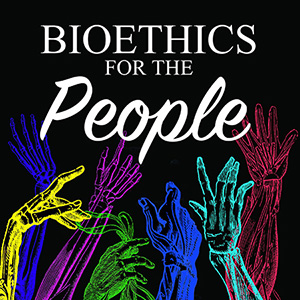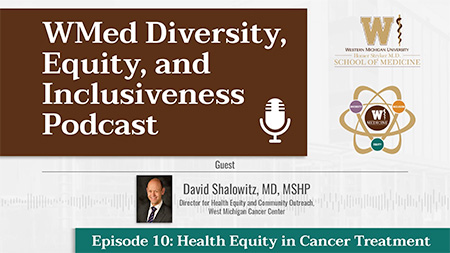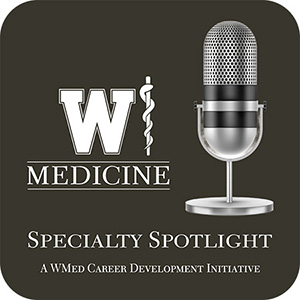
For some, it has been a powerful creative outlet for storytelling while others wield it as a tool to provide insight about the complex and important issues they wrestle with on the job.
And then there are those who are using the medium to help students with important decisions surrounding the Match or discussing topics like diversity, equity, and inclusion to enhance and strengthen the institutional culture at WMed.
Whatever the reason, faculty and students are launching and using podcasts to reach a broader audience outside the walls of the medical school and delve deeper into important topics central to the field of medicine and medical education.
“It has provided an opportunity for people interested in these topics to hear what experts have to say about them, but we try to be conversational and accessible to everyone,” said Tyler Gibb, JD, PhD, associate professor and co-chair of the Department of Medical Ethics, Humanities, and Law, who co-hosts the podcast “Bioethics for the People” with Devan Stahl, PhD, a fellow alum of the Albert Gnaegi Center for Health Care Ethics at Saint Louis University who serves as an associate professor of bioethics in the Department of Religion at Baylor University.
“The majority of our listeners who tune in and reach out are aware or tangentially connected to healthcare in some way and they hear about topics or cases but don’t know enough about bioethical issues to form their own opinions about them,” Dr. Gibb said. “In that way, we feel like we’re educating the people.”
Drs. Gibb and Stahl launched their podcast in 2020 in the midst of the COVID-19 pandemic, finally moving forward on an idea they had toyed with for years. The pandemic gave the duo time to reallocate some time, energy, and resources to get the project off the ground.
New seasons of the podcast are typically launched in the fall with new episodes – usually numbering 10 to 13 per season – released weekly through the end of the year. The project has proven successful, and the podcast currently boasts about 60 episodes and approximately 20,000 weekly subscribers.

This year, Drs. Gibb and Stahl released their fifth season of the podcast, with each episode drawing inspiration from textbooks and talking through classic medical ethics cases and their historical importance. In previous seasons, podcast episodes have covered topics including the opioid epidemic, COVID-19 vaccine mandates, and when it might be justifiable to deceive patients, among several other topics.
“It’s fun to put out an episode and have our listeners respond to it,” Dr. Gibb said. “It’s a lot quicker feedback than your normal academic publishing and more people are being exposed to these questions and topics than by anything I would ever write or publish.”
The list of avid listeners of the “Bioethics for the People” podcast includes Dr. Gibb’s grandmother, who is a 92-year-old retired labor and delivery nurse Dr. Gibb lovingly refers to as Grandma Nancy.
“If we miss a week, she texts me,” he said. “I think we will continue to do the podcast as long as it makes sense. Both of our institutions value the effort, creativity, and public engagement … As long as Grandma Nancy keeps listening, I’ll probably keep doing it.”
Meanwhile, a trio of fourth-year students at WMed – Sam Natla, Cameron Quon, and Stephen Szabadi – have used their podcast “War(d) Stories” as a creative outlet to share interesting stories and lessons from longtime WMed faculty and physicians, including Drs. Mark Loehrke and Rajiv Rangrass.
Szabadi said the idea for the podcast, which launched in 2021, came to him, Natla, and Quon near the conclusion of their second year at WMed. At the time, they were on the cusp of beginning clinical rotations but those activities were delayed because of the COVID-19 pandemic.
“We were just losing the wind in our sails in terms of inspiration,” Szabadi recalled.

And then, during a lecture with Robert Rebar, MD, professor emeritus in the Department of Obstetrics and Gynecology, Dr. Rebar began sharing stories about interesting cases he confronted during his career.
“They were funny and interesting stories and we thought it would make for great podcast material, and that other students might be inspired by them the way we were inspired by them,” Szabadi said.
The inaugural episode of the podcast was released in October 2021 and featured a live, in-depth conversation with Mark Loehrke, MD, former chair and associate professor emeritus in the Department of Medicine, covering the topic of failure. The venture was a success and through it Natla, Quon, and Szabadi were able to provide their classmates with perspective and inspiration.
“We all know failure is there but we don’t all confront it,” Natla said. “You could really tell how the students felt validated and connected with Dr. Loehrke.”
Since that initial episode in 2021, the students have released two additional episodes – a two-part conversation with Dr. Rangrass, a clinical assistant professor in the Department of Obstetrics and Gynecology. Their next two episodes, which are yet to released, will feature a conversation with Theo Gomes, DO, assistant professor in the departments of Medicine and Pediatric and Adolescent Medicine, who serves as program director for the Medicine-Pediatrics residency program.
As they look ahead to residency training next year and the conclusion of their time as students at WMed, Natla, Quon, and Szabadi said they plan to continue doing the podcast as their journey as aspiring physicians continues.
In many ways, the podcast and the process of bringing each episode to life has proven to be a creative outlet for the three students. Szabadi writes the music for each episode while Quon and Natla have been able to put to use their undergraduate experience in broadcast journalism and radio, respectively, to use.
“It’s really important for us to keep in mind what our overarching goal is and it’s really to make this a creative outlet for the three of us,” Quon said. “Medicine and medical school can be all-consuming. For us to be in medical school and on rotations, and then be able to come back from that and spend time doing something that we used to do professionally, it feels good to bring that real-world application to something outside of medicine to medicine.”
In the Office of Health Equity and Community Affairs at WMed, Cheryl Dickson, MD, MPH, chief diversity officer and associate dean for Health Equity, is leading a DEI podcast series that was launched in 2021. The podcast, which now has 11 episodes, focuses on important topics around DEI, including implicit bias, climate change and environmental justice, health equity in cancer treatment, and human trafficking.
Dr. Dickson said the podcast draws its inspiration from the Courageous Conversations series that is hosted regularly by the Office of Health Equity and Community Affairs, and was started on the suggestion of Kelsey Caras from the medical school’s Office of Continuing Education as a way to create enduring materials from those events. Listeners are also able to earn continuing education credit for each episode they listen to.
Since the launch of the podcast, more than 1,450 people have received CE credit for listening to an episode of the podcast.
“Excellent podcast, I learned a great deal,” one listener said after completing an episode and claiming CE credit.
“The program provides good insight into our natural and learned behaviors,” another listener said.

“The podcasts are an excellent way to provide information that listeners can benefit from and have a deeper conversation with leaders involved in DEI and belonging,” Dr. Dickson said. “It’s really about broadening those conversations and broadening their reach. We’re trying to enhance our culture at WMed and this is an important part of doing that and providing people with information about these important topics.”
Moving forward, Dr. Dickson said future episodes of the podcast will focus on several topics, including how health equity does or does not fit with artificial intelligence, the political determinants of health, and health equity and the unhoused.
While faculty like Drs. Gibb and Dickson, and students like Natla, Quon and Szabadi, are planning new episodes for their podcasts, Biren Shah, MD, assistant dean for Career Development, is launching a brand new podcast in January called the WMed Specialty Spotlight Podcast.
The monthly podcast, which is the brainchild of the medical school’s Career Development team, will serve to empower students at WMed and elsewhere as they navigate the Match and try to pinpoint what specialty they want to pursue in residency.
“There are many medical students who feel lost when it comes to picking a specialty and figuring out a path for their careers,” Dr. Shah said.
As a way of relieving that stress, Dr. Shah said each episode of the podcast will feature a conversation with a practicing physician who will answer questions about their specialty, how they decided their specialty was the right fit for them and how they have handled and navigated their long-term career planning.
The inaugural episode of the podcast will feature Dr. Gomes and the second episode, which will be released in February, will include a conversation with Kristi VanDerKolk, MD, assistant professor in the Department of Family and Community Medicine and program director for the Family Medicine-Kalamazoo residency program.
As the podcast continues, Dr. Shah said he plans to feature more conversations with WMed physicians and leaders, and then eventually branch out and invite guests such as WMed alumni, as well as physicians from outside the medical school.
“This is my first time doing a podcast so I’m learning as I go along,” Dr. Shah said.

